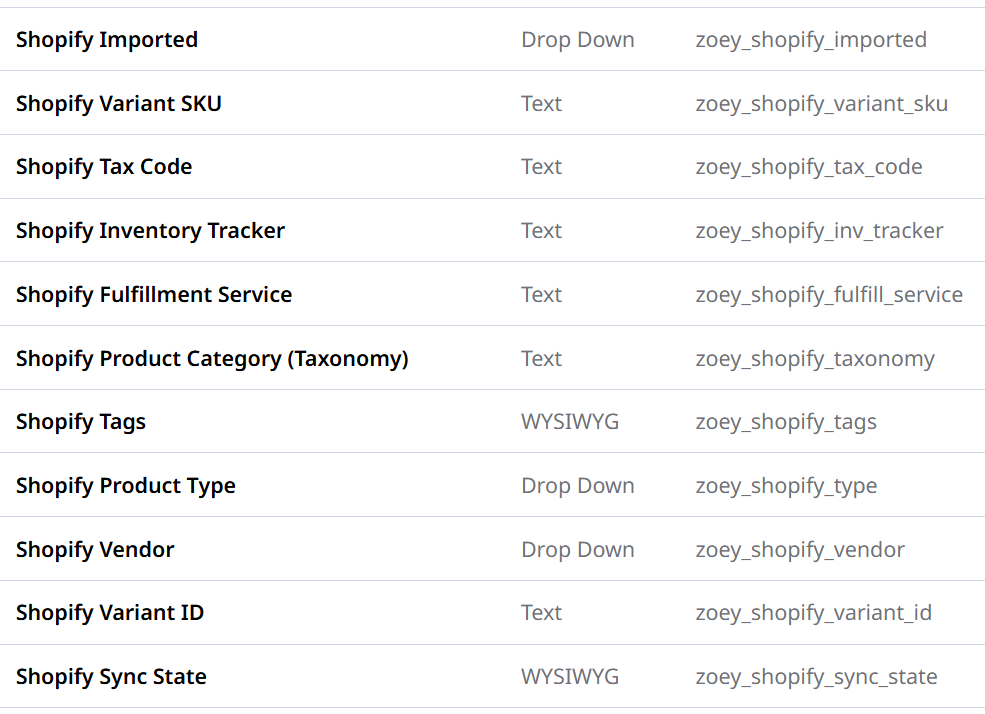Shopify Integration
The Zoey Shopify Integration gives your store the ability to import Orders from Shopify, export Shipments from Zoey, and send Product Inventory levels to Shopify.
Overview
The Zoey Shopify Integration connects to your Shopify account to import Orders placed by your customers!
Shopify orders can be imported automatically up to 10x per hour. The products are matched and the Order can be immediately marked paid or shipped! Choose the Payment and Shipping method to set and which default Account will be listed on all Orders.
Installing the Zoey Shopify App
Install the app on Shopify to get started!Click here for the Zoey B2B Integration app on Shopify.
Make sure you're logged into the Zoey Admin in the same browser to complete the installation in Shopify.
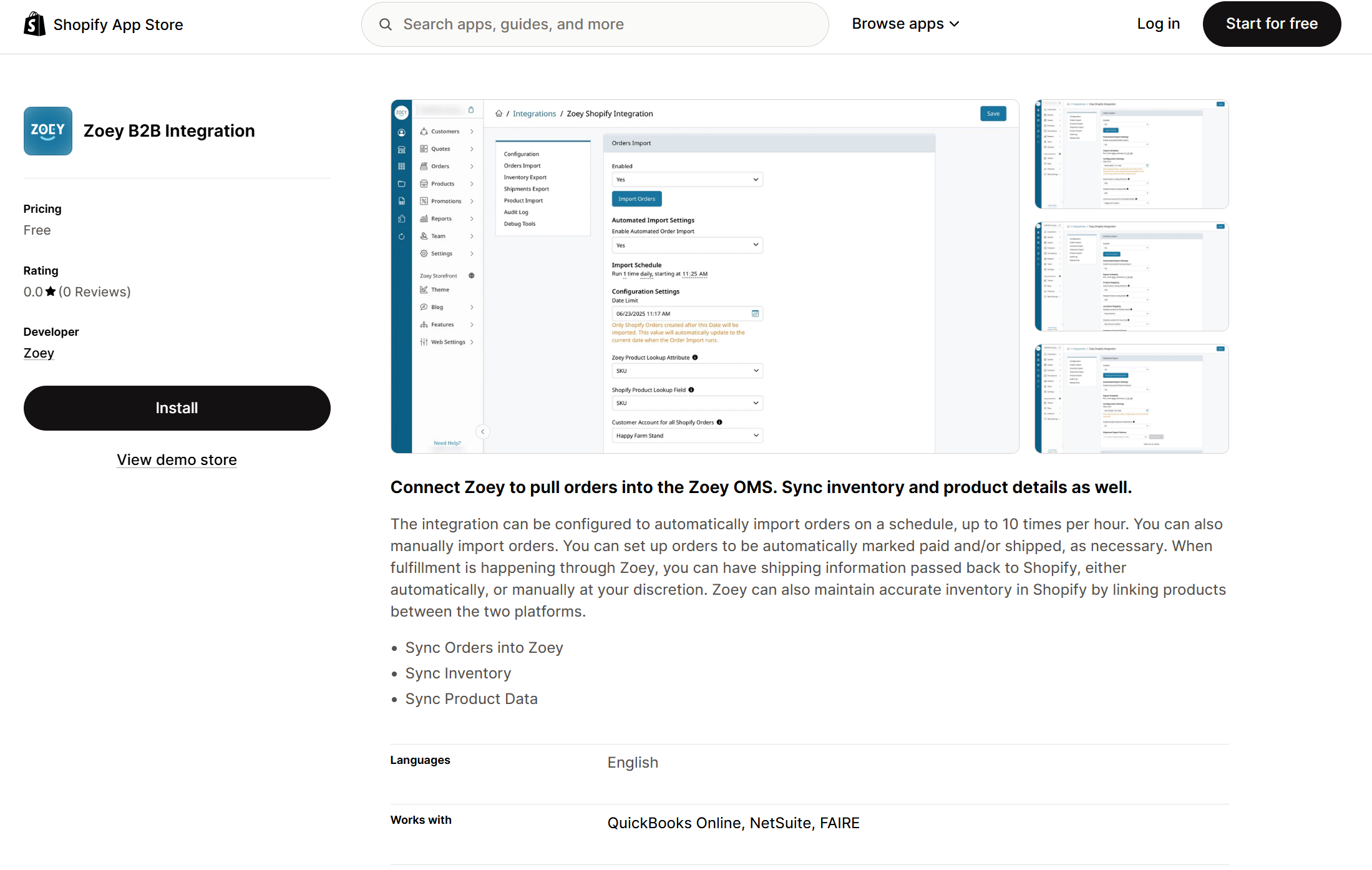
Connecting Zoey and Shopify
After installing the Zoey Shopify App, the stores will be connected automatically!
Then find the Zoey Shopify Integration settings by clicking the puzzle-piece icon to get to the Integrations list and open the Zoey Shopify Integration settings by clicking Manage Connection.

Sync Overview
There are 5 sync processes which run independently to transfer data and update products between Zoey and Shopify.
- Product Sync
- Pricing Sync
- Inventory Sync
- Order Sync
- Shipment Sync
Each sync can be scheduled to run automatically to sync new records or updates since the last run time.
There is also a Bulk Import / Export button in each section that will let you list specific orders, or products to manually sync them.
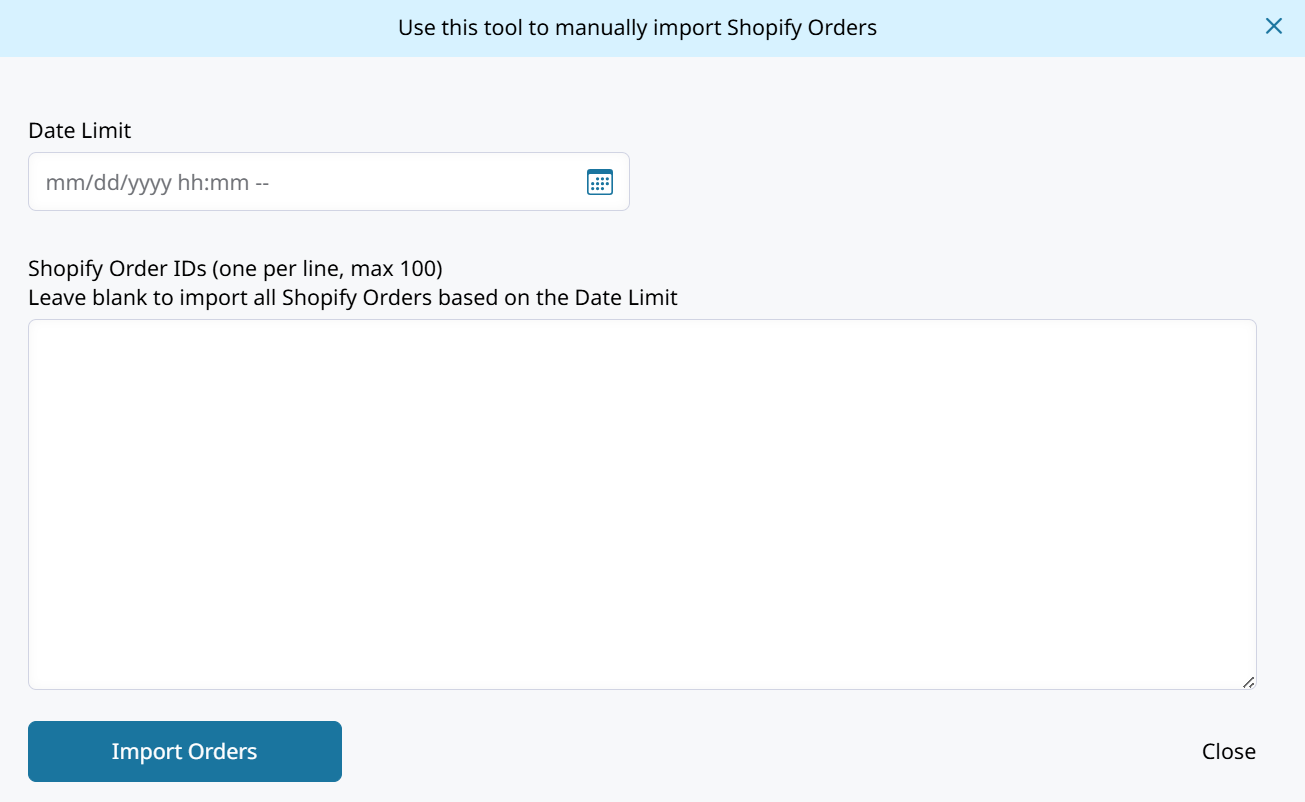
Product Sync
The Zoey Shopify Integration can sync product updates automatically in one direction. Manual updates can be sent from imported into, or exported from Zoey. The integration saves the Shopify Product ID (zoey_shopify_product_id) and Variant ID (zoey_shopify_variant_id) on the matching product in Zoey to link them between platforms.
Set the Sync Direction to either:
- Shopify to Zoey (Import Products)
- Zoey to Shopify (Export Products)
To manually import or export products, set the Sync Direction without saving and then use the Bulk Import from Shopify or Bulk Export to Shopify button.
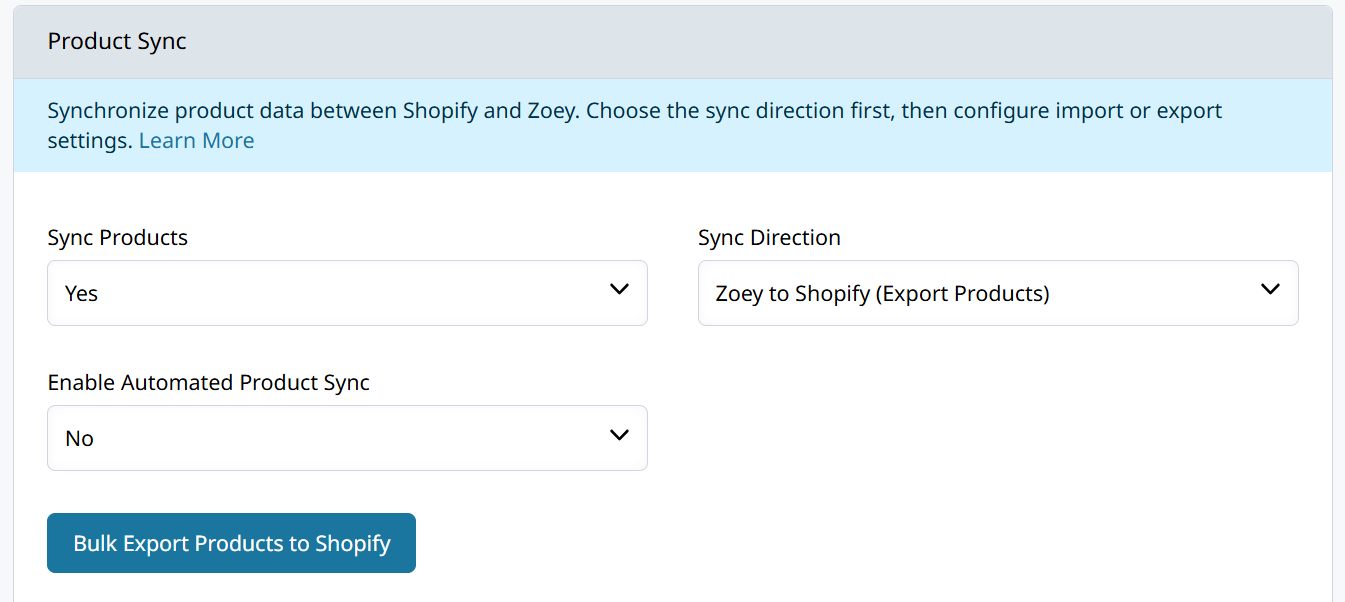
Set Enable Automated Product Sync to Yes to schedule the sync after having tested and configured all of the settings.
The Product Sync can create new products or update the details such as Description, Name, Images, Categories, and more.
Price and Inventory each have their own sync processes.
Product Sync Settings
Configure the Product Sync settings to determine whether new products are created by the integration, and whether those products are made Active.
These settings and their descriptions change based on whether you're syncing to, or from Zoey.

Zoey to Shopify
- Create New Products When set to Yes, new products will be created in Shopify if they don't already exist.
- Make Variants Visible Individually (Shopify to Zoey only) When set to Yes, newly created variations (children of configurable products) will be visible in catalog and search.
- Export New Products as Active (Zoey to Shopify) When enabled, newly exported products will be set as Active in Shopify. When disabled, products will be created as a Draft.
- Import New Products as Enabled (Shopify to Zoey)
When enabled, newly imported products will be set as enabled in Zoey. - Sync Images
When enabled, product images will be synced to/from Shopify.

Shopify to Zoey
Zoey Product Description Update
When the Product Update from Shopify to Zoey is ran, your Zoey Product's Description will be replaced by the Shopify Product Description.
The HTML is copied over! That means text formatting such as alignment, boldening, and any other encoded mark-up should be exactly the same in Zoey after syncing.
The Zoey Product Description is completely replaced by what's in Shopify if a matching product is found!Do not run the Product Update if there are products in Shopify lacking a description.
The Zoey Overview (
short_description) is not affected by this sync. That content will remain unchanged in Zoey.
Zoey Product Image Update
When the Product Update from Shopify to Zoey is ran, all of the Shopify Product Images in are set on the Zoey Product, if enabled.
Zoey Product Theme Template Update
When the Product Update from Shopify to Zoey is ran, your Zoey Product's Design Template will be updated.
Design Templates are created in your Theme. A product's can use one of multiple page templates that control what's displayed on the product page.
The Shopify Theme template's name must exactly match the Product Template in Zoey!
If there is a Theme template set on a Product in Shopify with a name that matches a Product Design Template in Zoey, then that template will be used in Zoey.
If the Spotify Product Theme template set is the Default, then your Zoey Theme's default Product Template will be set on the product.
If no match is found, then your Default Product Page Template will be set on the Zoey Product.

Category Mapping
Categories for your products can be mapped through the Shopify Product Tags.Set Sync Category Assignments to Yes and use the Product Tags described below to set the category for the product in Zoey.
When exporting products to Shopify, Zoey category assignments will be added as product tags in the format: zcat_123.
When importing products to Zoey, control Product Category assignment in Zoey through the Product Tags in Shopify.
Tag your products in Shopify with the Zoey Category ID with the following format: zcat_{category_id}
The static part of the tag zcat_ should remain unchanged. The Zoey Category ID must come after to create tag like: zcat_114. This tag would set the product into the Zoey Category with ID: 114.

Products can be mapped to multiple categories using multiple tags.
Pricing Sync
Configure the Pricing Sync to determine in which direction price updates will be sent, and map the price fields between systems.
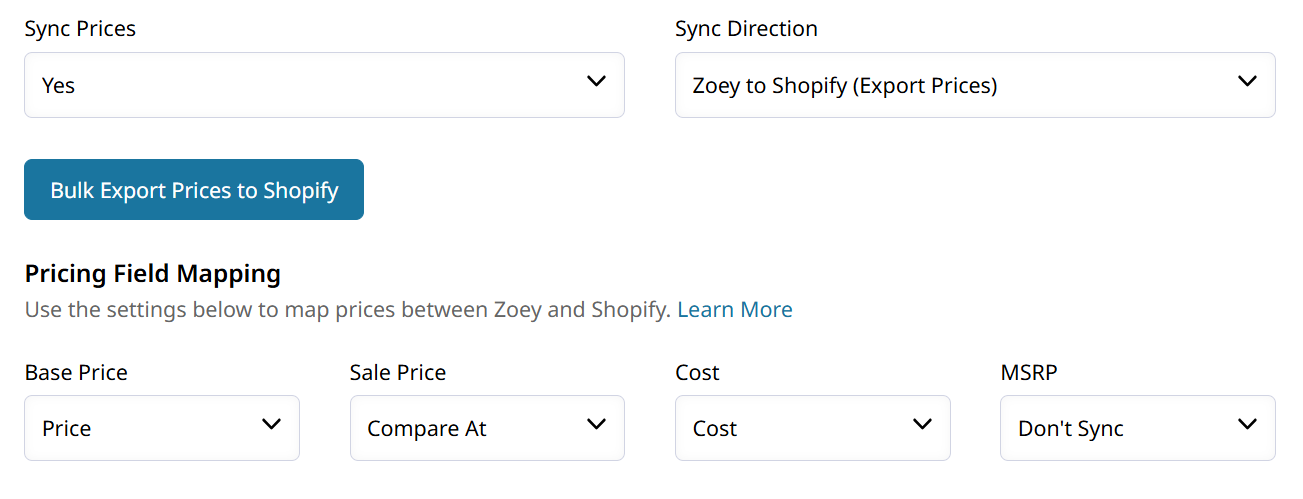
Zoey to Shopify Price Export
Shopify has their own terminology and price fields that we'll need to map to our Zoey Prices. Map those fields here to determine which Shopify Price will be imported as the Zoey Base Price
The Zoey Customer Group Price, Base Price, Sale Price, Cost, and MSRP can each be mapped for the pricing sync to set the prices.
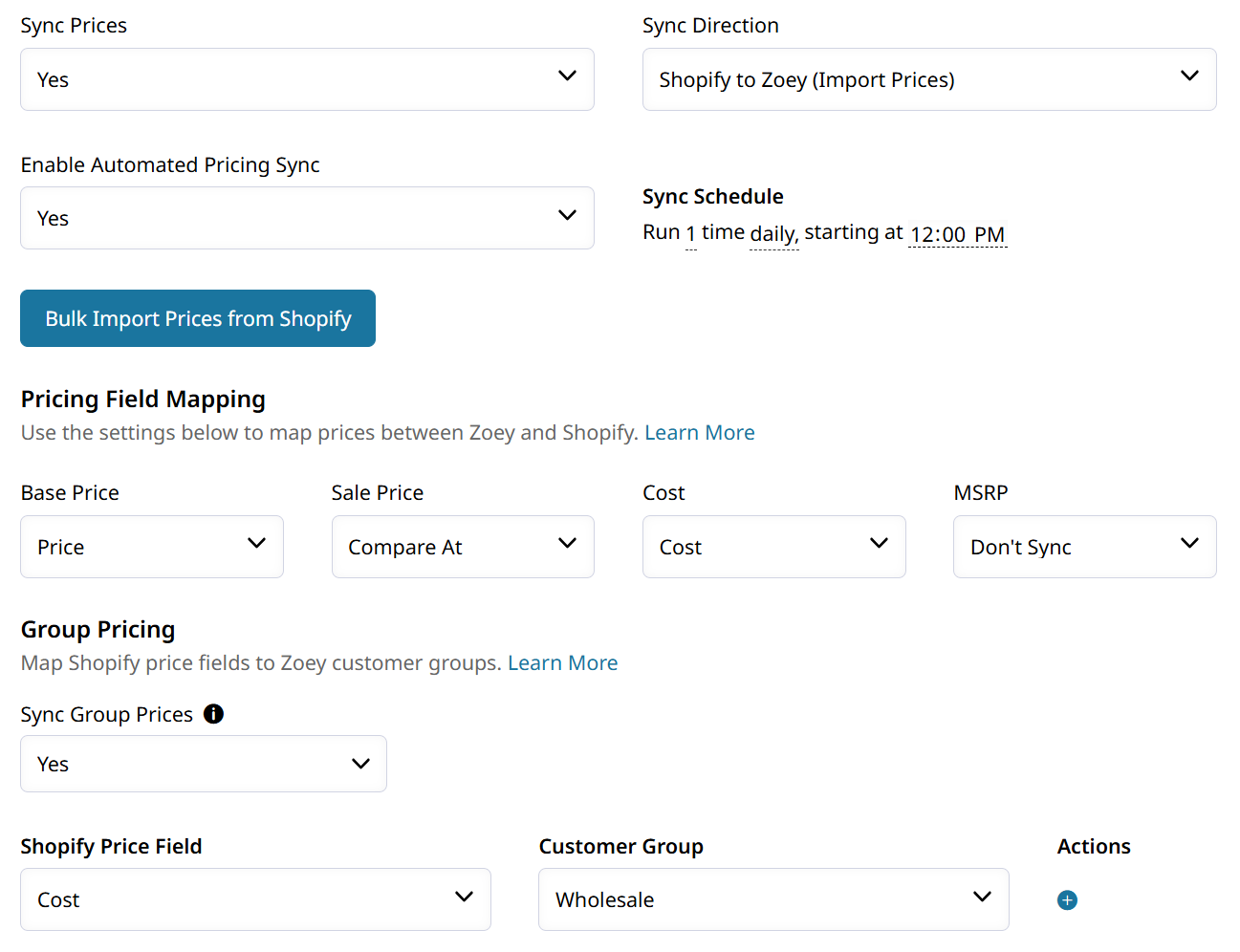
Shopify to Zoey Price Import
Customer Group Prices can also be mapped from a Shopify Price Field to automatically set special prices for your Zoey customer groups.
Inventory Sync
When the automatic Sync Direction is Shopify to Zoey, inventory quantities from your Shopify store will sync over to matched Zoey Products.
When syncing inventory from Zoey to Shopify you can also set up Advanced Filters to limit which products' inventory will be updated in Shopify.
Advanced Filters for Inventory Export to Shopify
Advanced Filters assist with inventory exports to Shopify by enabling you to limit which product inventory gets synced.
There are fields available by default to help filter the Inventory Sync, such as:
shopify_product- True / False depending on if the product was created by Shopifyzoey_shopify_product_id- Internal Shopify Product IDzoey_shopify_type- The product type within Shopify
Click on Advanced Filters to begin adding the filter logic.
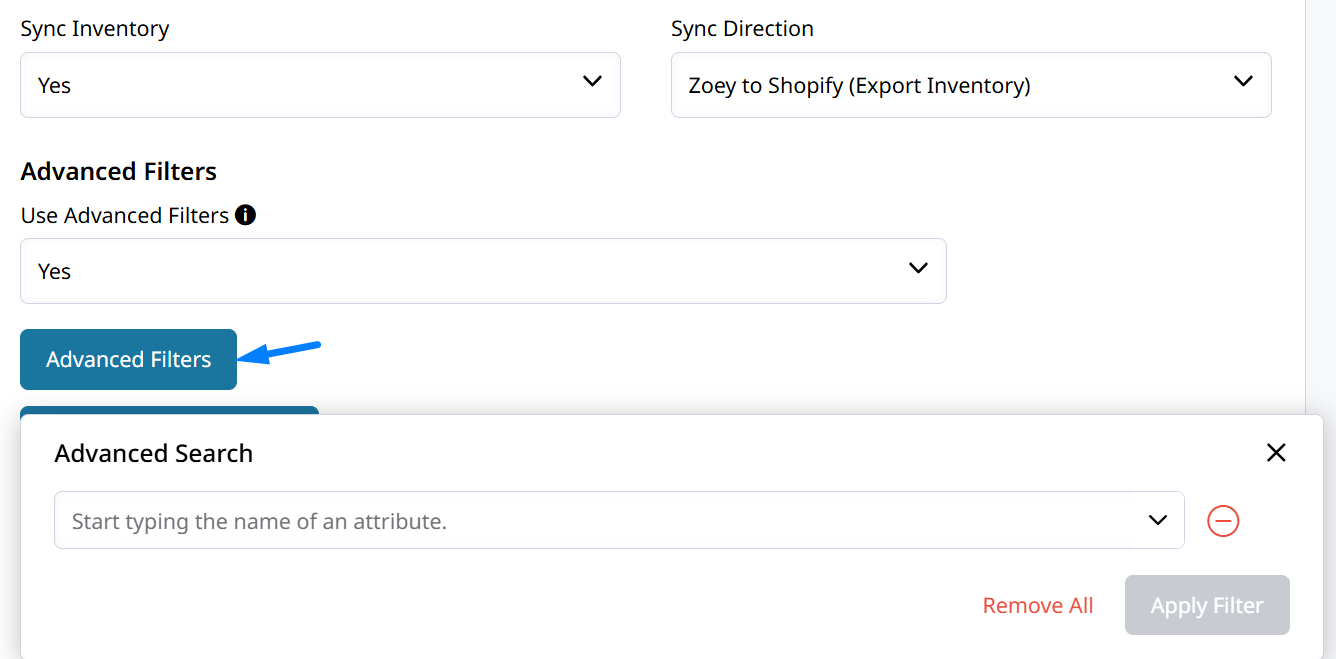
Use these filters to limit which Shopify Products get their available inventory quantities updated by Zoey through the integration.
Product Sync Table
The product sync table keeps track of the integration's attempts to update a Shopify product. It will perform maximum of 3 retries before skipping that product in subsequent inventory syncs.
Click on Clear Product Sync Table to remove all sync history, allowing products that previously failed multiple times to be retried again. Use this when changing filters or to reset the sync state.

Location Mapping
Both Zoey and Shopify have the concept of Inventory Locations. The Inventory Sync settings enable you to map the inventory locations between systems to determine which stock qty is sent to, or from Zoey.

Map the Shopify Inventory Locations to where the inventory quantity should be stored.
If you don't use Inventory Locations in Zoey, select "Default Stock" to sync inventory to the default
qtyfield of your Zoey Products.
Order Sync
Your Shopify Orders can be synced into Zoey for processing or record keeping!
Set Enabled to Yes and begin configuring the Zoey Shopify Integration settings.
Automatically Importing Orders from Shopify
Set Enable Automated Order Import to Yes.
Configure the Import Schedule to set how frequently the integration attempts to sync new orders.
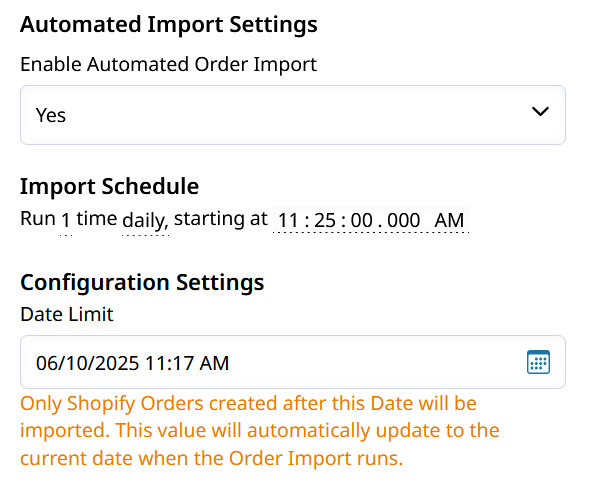
The Date Limit will determine which orders the integration attempts to import.
Manually Importing Orders from Shopify
Clicking the Import Orders button opens a pull-out menu that lets you determine which Faire Orders get synced into Zoey.
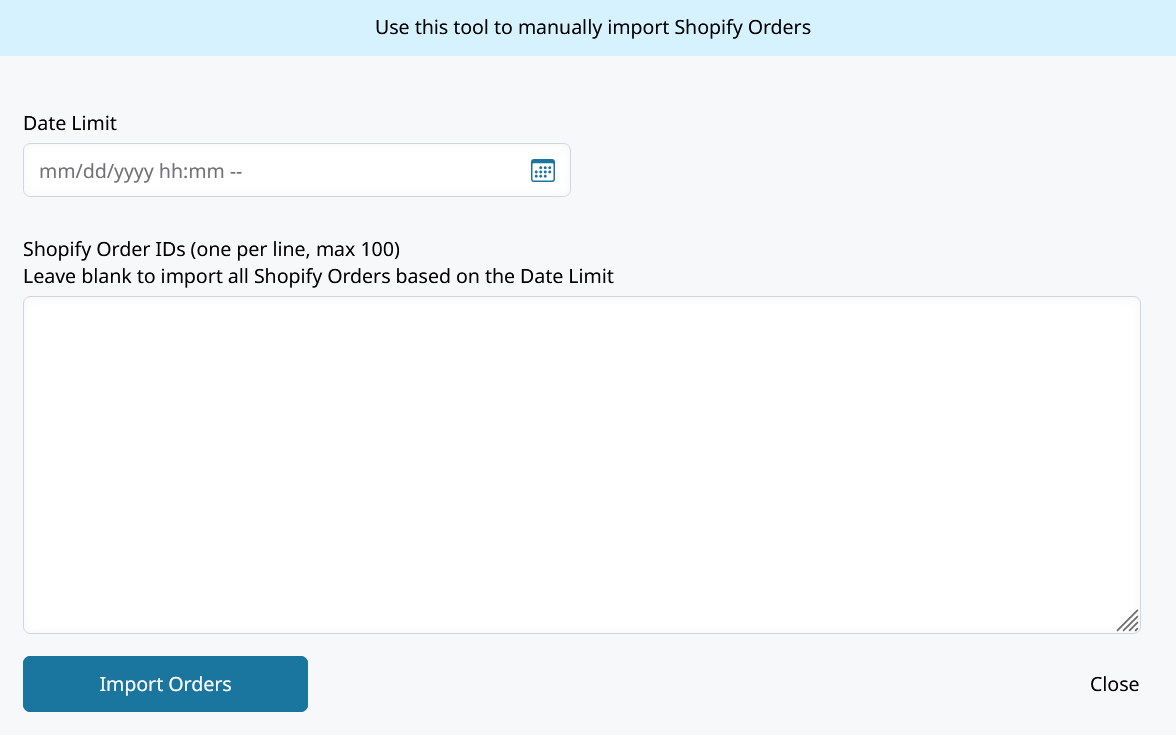
Here you can manually import orders from Faire which have been placed after the date and time set in the Date Limit or by listing internal IDs of Shopify orders.
Import Specific Orders by ID
Importing specific orders from Shopify requires the numeric internal ID like 6401869414717.

Copy the internal ID from the URL bar of the order, shown above. This ID can be used to import that order.
The Shopify internal order ID will be set as the External ID of a Zoey order to display and filter in the order grid.
Import Orders by Date Limit
Set the Date Limit to import all orders placed in Shopify after that date and time. No specific IDs need to be listed. All orders created in Shopify after the set date and time will be imported
Each order can only get imported once! The Date Limit gets updated each time the import runs.
If you try to import a Shopify order which was already brought in, an error will be presented.
Zoey Account for All Shopify Orders
Shopify does not provide unique information for Zoey to create or assign Orders to different Accounts.
All Shopify Orders will be assigned to one Zoey Account.You can create this account in Customers > Accounts > Create New Account, then select the Account here.
In Customer Account for all Shopify Orders select the Zoey Account which all Shopify Orders will be imported to.

Default Payment and Shipping Method
Orders imported from Shopify will be created with the shipping and payment methods set as default.
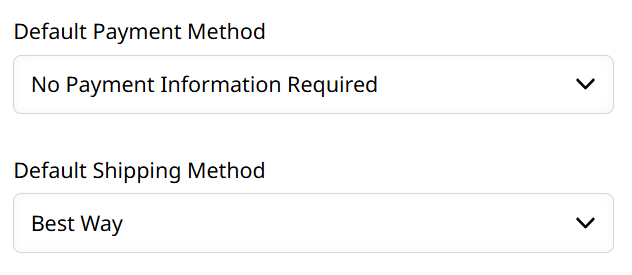
Importing Order as Paid or Shipped
Orders created by the Shopify integration will be immediately invoiced and marked paid if Import As Paid is set to Yes.
If Import As Shipped is set to Yes, a shipment will be created for all of the items automatically as well.
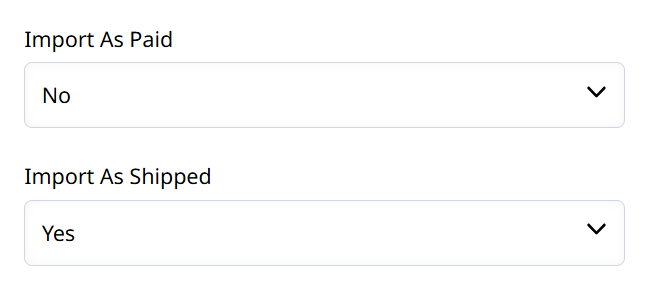
Troubleshooting Shopify Order Import
The Order Import Failures grid will list orders which failed to be imported and the error reported.
Click on each Shopify Order to see details for why it failed to be imported.

Check the error logged in to each Shopify Order ID by clicking on it. Attempt to resolve the specified issue in Shopify or Zoey.
Check the box and open Bulk Actions to Retry Import after correcting the issue.
Shipment Sync
After an Order is Shipped in Zoey, that fulfillment can be synced to your Shopify Order!
Tracking information will be sent to Shopify and set on the fulfillments. Shipments can be sent automatically on a set schedule.
Automatically Send Shipments to Shopify
Set Enable Automated Shipment Export to Yes and configure your Shipment Export schedule.
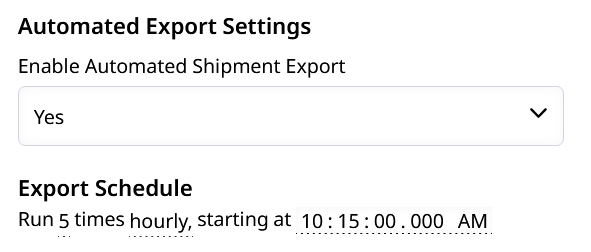
Manually Export Shipments to Shopify
Click the Shipping & Tracking Export button to open the pull-out menu. There you can list Zoey Order IDs to attempt to sync their Shipments to Shopify.
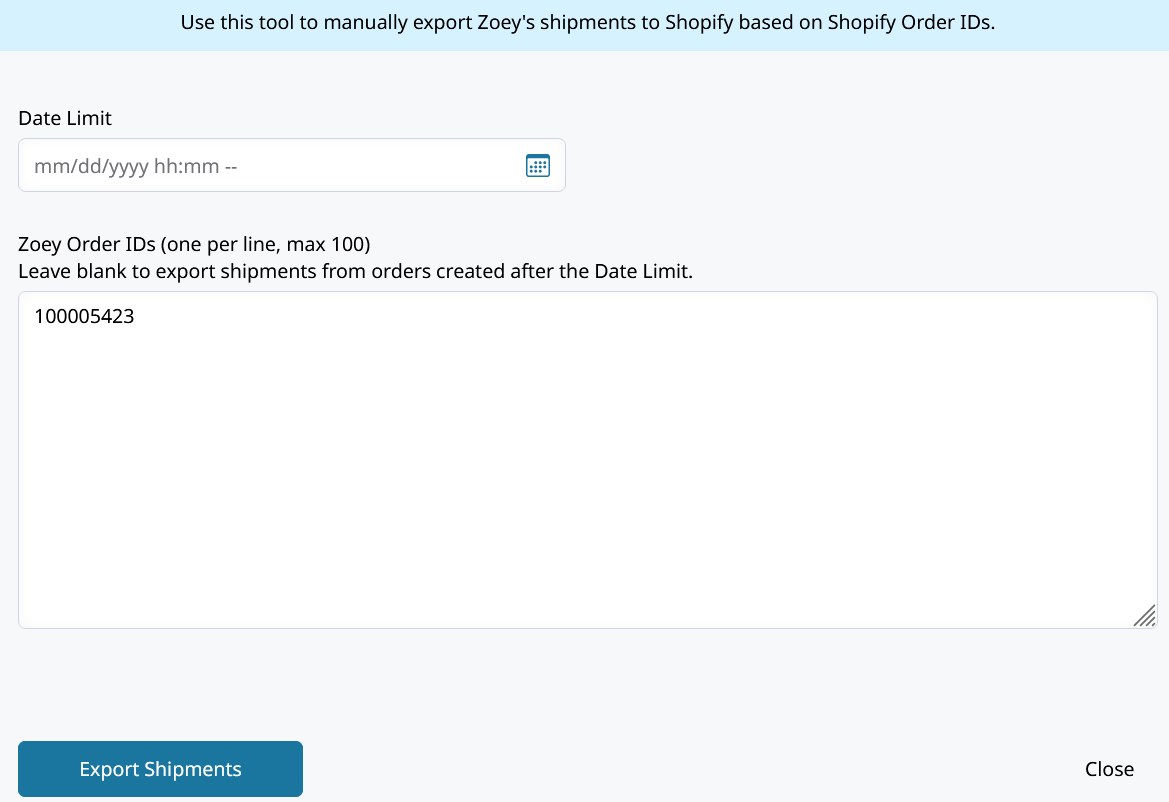
Shopify Shipment Notification Email
Shopify will notify your customer by emailing them when an Order is fulfilled. If you're shipping the Order in Zoey, then Zoey will also send a Shipment Email.
Set Enable Shopify Shipment Notification to No to prevent Shopify from emailing customers about Shipments synced from Zoey.
Shopify Integration Audit Log
The Audit log will record all import or export jobs and whether there were any errors. This list will show the sync jobs from all the Zoey Shopify integration features. This list can be filtered by whether the sync finished successfully, finished with errors, or did not finish.
Click on a log to view its details and attachments!
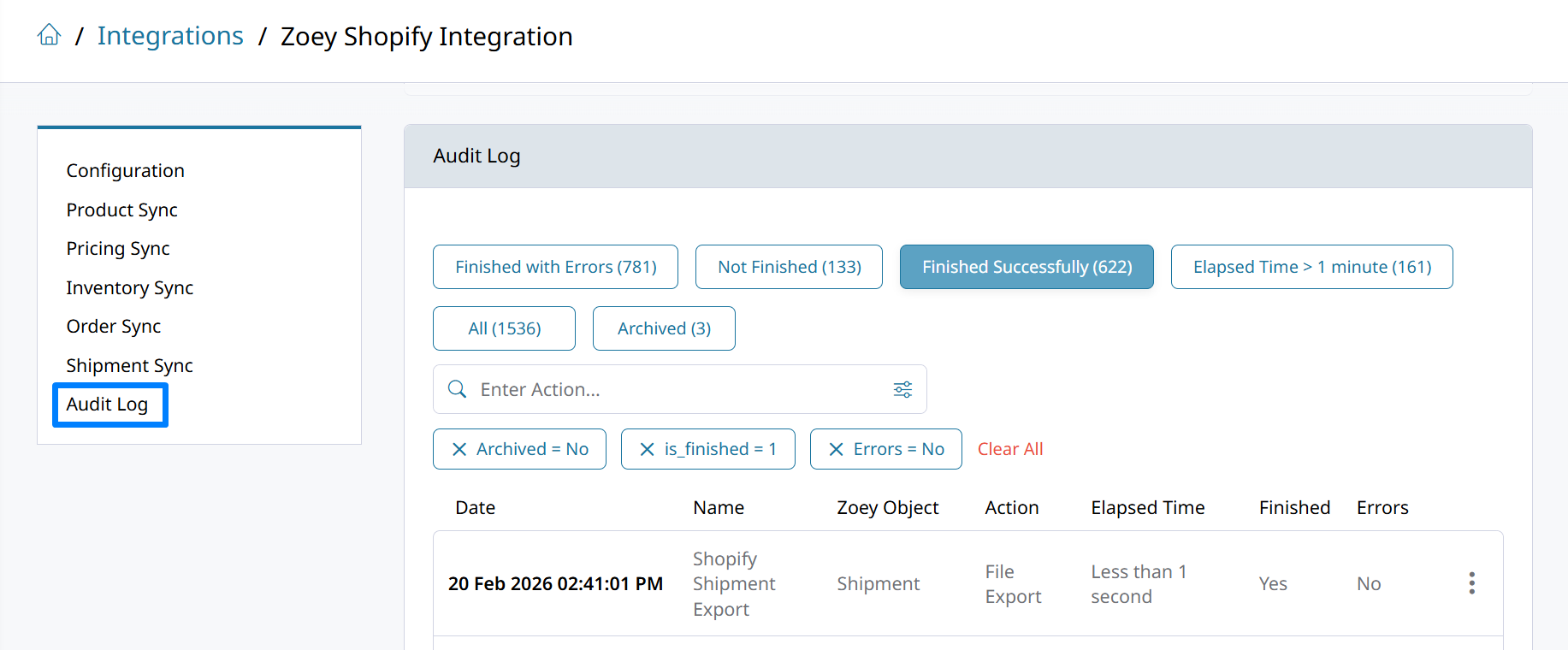
Updated 1 day ago

